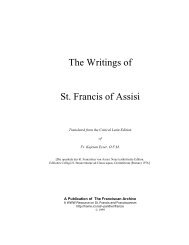the history of heresies, and their refutation - Catholic Apologetics ...
the history of heresies, and their refutation - Catholic Apologetics ...
the history of heresies, and their refutation - Catholic Apologetics ...
You also want an ePaper? Increase the reach of your titles
YUMPU automatically turns print PDFs into web optimized ePapers that Google loves.
(5)0rsi, t. 4, 1. 11, n. 61 & 52.<br />
<br />
4. These two heretical opinions fall to <strong>the</strong> ground at once, by proving <strong>the</strong> falsity <strong>of</strong> <strong>the</strong> first proposition,<br />
that <strong>the</strong> Church consists <strong>of</strong> <strong>the</strong> good alone. St. Augustine proves clearly that <strong>the</strong>se texts <strong>of</strong> St. Paul <strong>and</strong> St.<br />
John, refer to <strong>the</strong> triumphant <strong>and</strong> not to <strong>the</strong> militant Church, for our Redeemer, speaking <strong>of</strong> <strong>the</strong> militant<br />
Church, says, in many places, it contains both good <strong>and</strong> bad; in one place he likens it to a threshing floor,<br />
which contains both straw <strong>and</strong> grain : " He will thoroughly cleanse his floor, <strong>and</strong> ga<strong>the</strong>r his wheat into<br />
<strong>the</strong> barn, but <strong>the</strong> chaff he will burn with unquenchable fire" (Matt, iii, 12). In ano<strong>the</strong>r place he compares it<br />
to a field sown with good seed, <strong>and</strong> cockle growing amongst it : " Let both grow" he says, " till <strong>the</strong> time <strong>of</strong><br />
<strong>the</strong> harvest, <strong>and</strong> <strong>the</strong>n I will say to <strong>the</strong> reapers, Ga<strong>the</strong>r up first <strong>the</strong> cockle <strong>and</strong> bind it into bundles to burn,<br />
but ga<strong>the</strong>r <strong>the</strong> wheat into my barn" (Matt, xiii, 3) (6).<br />
<br />
5. The Donatists were not content with <strong>the</strong> crime <strong>of</strong> heresy, but committed a thous<strong>and</strong> o<strong>the</strong>rs, if possible<br />
<strong>of</strong> a deeper dye. They destroyed <strong>the</strong> altars <strong>of</strong> <strong>the</strong> <strong>Catholic</strong>s, broke <strong>the</strong> chalices, spilled <strong>the</strong> holy Chrism on<br />
<strong>the</strong> ground, <strong>and</strong> threw <strong>the</strong> holy Eucharist to <strong>the</strong> dogs. But St. Optatus Milevitanus (7) informs us that God<br />
did not suffer <strong>the</strong> indignity to his sacred body <strong>and</strong> blood to go unpunished, for <strong>the</strong> dogs getting mad<br />
turned on <strong>the</strong>ir own masters, <strong>and</strong> tore <strong>the</strong>m, as if in revenge for <strong>the</strong> insult <strong>of</strong>fered to <strong>the</strong> body <strong>of</strong> Jesus<br />
Christ. Not satisfied with tormenting <strong>the</strong> living, <strong>the</strong>y outraged <strong>the</strong> dead, whom <strong>the</strong>y dragged out <strong>of</strong> <strong>the</strong>ir<br />
graves, <strong>and</strong> exposed to <strong>the</strong> most unheard-<strong>of</strong> indignities. About this time, also, <strong>the</strong> Circumcellionists<br />
sprung from <strong>the</strong> Donatists. Their chiefs were Faber <strong>and</strong> Maxidus, <strong>and</strong> <strong>the</strong>y were called Circumcellionists<br />
from running about from town to town <strong>and</strong> house to house. They were called by Donatus <strong>the</strong> chiefs <strong>of</strong><br />
<strong>the</strong> saints; <strong>the</strong>y boasted that <strong>the</strong>y were <strong>the</strong> redressors <strong>of</strong> all wrong <strong>and</strong> injustice through <strong>the</strong> world,<br />
though nothing could be more unjust than <strong>the</strong>ir own proceedings. They gave liberty to slaves, <strong>and</strong><br />
comm<strong>and</strong>ed debtors not to pay <strong>the</strong>ir debts, telling <strong>the</strong>m <strong>the</strong>y were freed from all obligation. Their cruelty<br />
equalled <strong>the</strong>ir fanaticism, for <strong>the</strong>y went about in armed b<strong>and</strong>s, <strong>and</strong> put to death those who did not<br />
become proselytes to <strong>the</strong>ir doctrine; but what was more astonishing than all was to see this fury turned<br />
against <strong>the</strong>mselves, for many <strong>of</strong> <strong>the</strong>m committed suicide by throwing <strong>the</strong>mselves over precipices, some<br />
cast <strong>the</strong>mselves into <strong>the</strong> fire, o<strong>the</strong>rs drowned <strong>the</strong>mselves, or cut <strong>the</strong>ir throats, <strong>and</strong> endeavoured to induce<br />
o<strong>the</strong>rs to follow <strong>the</strong>ir example, telling <strong>the</strong>m that all who died so were martyrs; even women followed <strong>the</strong><br />
example <strong>of</strong> <strong>the</strong>ir husb<strong>and</strong>s in this madness, <strong>and</strong> St. Augustine tells us that even some, in a state <strong>of</strong><br />
pregnancy, threw <strong>the</strong>mselves down precipices.<br />
(6) Nat. Alex. t. 9, diss. 31. (7) St. Opt. I. 2, de Donatis.<br />
<br />
It is true that even <strong>the</strong> Donatist bishops endeavoured by every means to put a stop to such frightful<br />
fanaticism, <strong>and</strong> even called in <strong>the</strong> authority <strong>of</strong> <strong>the</strong> secular power to aid <strong>the</strong>m, but <strong>the</strong>y could not deny that<br />
<strong>the</strong>y were <strong>the</strong>ir own disciples, <strong>and</strong> that <strong>the</strong>y became <strong>the</strong> victims <strong>of</strong> such perverse doctrines from<br />
following <strong>the</strong>ir own example (8).<br />
<br />
6. The Emperors Constantine <strong>and</strong> Constans, sons <strong>of</strong> Constantine <strong>the</strong> Great <strong>and</strong> Valentinian, issued several<br />
edicts against <strong>the</strong> Donatists, but all was <strong>of</strong> little avail. In <strong>the</strong> reign <strong>of</strong> Honorious an edict was published,<br />
giving liberty to all sects to pr<strong>of</strong>ess publicly <strong>the</strong>ir doctrines, but about <strong>the</strong> year 410 <strong>the</strong> Donatists, taking<br />
advantage <strong>of</strong> this, broke out into several acts <strong>of</strong> violence, which so exasperated Honorious that, at <strong>the</strong><br />
suggestion <strong>of</strong> <strong>the</strong> <strong>Catholic</strong> bishops <strong>of</strong> Africa, he revoked <strong>the</strong> edict. He <strong>the</strong>n published that law (L. 51,<br />
Codex Theodosianus), which punishes with confiscation <strong>of</strong> property <strong>the</strong> practice <strong>of</strong> any religion except<br />
<strong>the</strong> <strong>Catholic</strong>, <strong>and</strong> even with pain <strong>of</strong> death if <strong>the</strong> pr<strong>of</strong>essors <strong>of</strong> any heretical doctrines should publicly<br />
assemble in <strong>the</strong>ir conventicles. In order, however, entirely to extinguish <strong>the</strong> heresy <strong>of</strong> Donatus, he sent <strong>the</strong><br />
Imperial Tribune, Marcellinus, a man <strong>of</strong> <strong>the</strong> greatest learning <strong>and</strong> prudence, into Africa, with orders to<br />
assemble all <strong>the</strong> African bishops, both <strong>Catholic</strong>s <strong>and</strong> Donatists, in Carthage, to proceed to a conference to<br />
see who was right <strong>and</strong> who was wrong, that peace should be established between <strong>the</strong>m. The Donatists at<br />
first refused to come, but <strong>the</strong> edicts <strong>of</strong> Honorius were too strict to be avoided, <strong>and</strong> <strong>the</strong>y consented, <strong>and</strong><br />
<strong>the</strong> conference was held in <strong>the</strong> Baths <strong>of</strong> Gazilian. Two hundred <strong>and</strong> eighty-six <strong>Catholic</strong>s <strong>and</strong> two hundred<br />
<strong>and</strong> seventy-nine Donatists assembled, but Marcellinus, to avoid confusion, would allow only thirty-six,<br />
eighteen on each side, to hold <strong>the</strong> conference, <strong>the</strong>se eighteen to be chosen from among all <strong>the</strong> rest. The<br />
schismatics refused to obey <strong>the</strong> regulations <strong>of</strong> Marcellinus, <strong>and</strong> used every stratagem to avoid coming to<br />
<strong>the</strong> point; especially <strong>the</strong>y endeavoured to cushion <strong>the</strong> question concerning <strong>the</strong> true Church, but, with all<br />
Page 22 <strong>of</strong> 352













